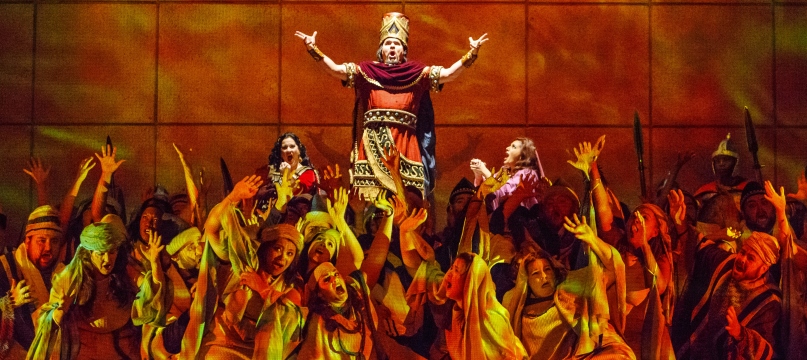Part I
In the Temple of Solomon in Jerusalem, the Israelites pray for help against Nabucco (Nebuchadnezzar), the King of Babylon, who has attacked the city. Zaccaria, their high priest, enters with Nabucco’s daughter, Fenena, whom the Hebrews hold hostage. He reassures his people that the Lord will not forsake them. As the Israelites leave, Ismaele, nephew of the king of Jerusalem, is left alone with Fenena, who helped him escape from imprisonment in Babylon. Their conversation is interrupted by the sudden appearance of Fenena’s half-sister, Abigaille, with some Babylonian soldiers. Abigaille, who is also in love with Ismaele, tells him that she can save his people if he will return her love, but he refuses. The Israelites rush back into the temple in a panic, and when Nabucco enters with his warriors, Zaccaria confronts him, threatening to kill Fenena. Ismaele disarms Zaccaria and delivers Fenena to her father. Nabucco orders the destruction of the temple.
Part II
Nabucco has appointed Fenena regent while he is away at war. Abigaille, back in the royal palace in Babylon, has found a document saying that she is not the king’s daughter, but the child of slaves. Foreseeing a future in which Fenena and Ismaele will rule together over Babylon, she swears vengeance on Nabucco and Fenena. The High Priest of Baal arrives with news that Fenena has freed the Israelite prisoners. As a result of Fenena’s treason, he offers the throne to Abigaille and spreads a rumor that Nabucco has died in battle. Meanwhile, Zaccaria prays for inspiration to persuade the Babylonians to give up their false idols. Ismaele enters and the priests accuse him of treachery, but Zaccaria announces that he has been pardoned for saving a fellow Israelite—the newly converted Fenena. An officer rushes in to warn Fenena that the king is dead and her life is in danger. Before she can escape, the High Priest of Baal arrives with Abigaille and the Babylonians, who proclaim Abigaille ruler. She is about to crown herself when, to the astonishment of all, Nabucco appears. He snatches the crown from her, faces the crowd and declares himself not only their king but their god. For this blasphemy, a thunderbolt strikes him down. A triumphant Abigaille takes the crown for herself.
Part III
In the Hanging Gardens, the Babylonians hail Abigaille as their ruler. The High Priest urges her to have the Israelites killed, but before she can give the order, a disheveled Nabucco wanders in. Abigaille dismisses the crowd and, alone with Nabucco, tricks him into signing the death warrant for the captive Israelites. He asks what will happen to Fenena, and Abigaille replies that she too must die. When Nabucco tries to find the document proving Abigaille’s ancestry, she produces it and tears it to pieces. He pleads in vain for Fenena’s life. On the banks of the Euphrates, the Israelites rest from forced labor, their thoughts turning to their homeland. Zaccaria predicts they will overcome captivity and obliterate Babylon with the help of God.
Part IV
Fenena and the Israelites are led to execution, and Nabucco can only watch, as he has been imprisoned by Abigaille. Desperate, he prays to the God of Israel for forgiveness, pledging to convert himself and his people. His sanity restored, he forces open the door and summons his soldiers to regain the throne and save his daughter. The Israelites are about to be executed. Fenena prays to be received into heaven when Nabucco rushes in and stops the sacrifice. Abigaille, full of remorse, takes poison and dies, confessing her crimes and praying to the God of Israel to pardon her. Nabucco announces his conversion and frees the Israelites, telling them to return to their native land and rebuild their temple. Israelites and Babylonians are united in praising God.
- Courtesy of Opera News, freely edited





 Nabucco Cast & Creative Team
Nabucco Cast & Creative Team












